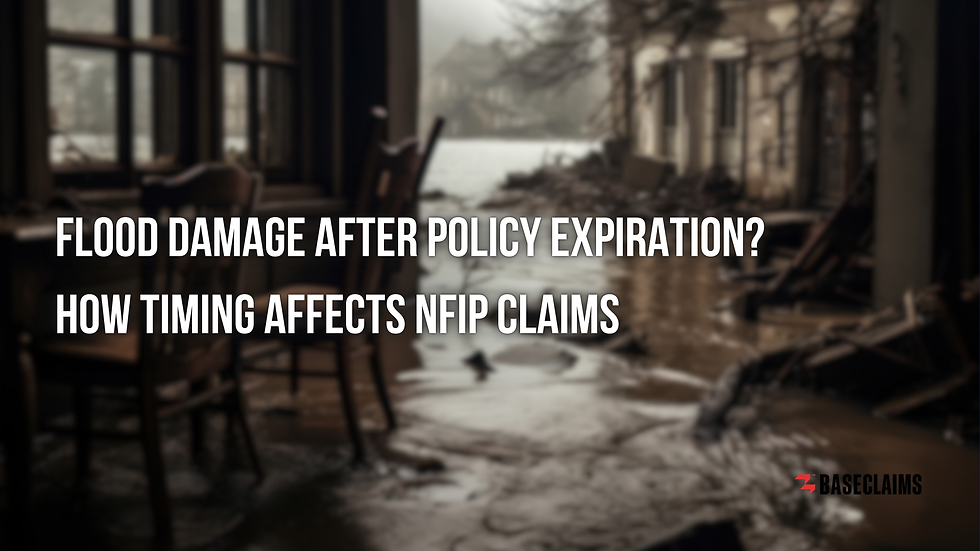How to File Insurance Claims for Saltwater Intrusion and Coastal Flooding
- Benji Licht
- Jun 11, 2025
- 4 min read
Updated: Jun 12, 2025
🌊 Filing Claims for Saltwater and Coastal Flooding
Living in coastal regions like South Florida exposes homeowners to various environmental risks, and one of the most damaging hazards is saltwater intrusion caused by coastal flooding. Understanding how to protect your property and file insurance claims for this type of damage is crucial for recovery.

🧂 The Impact of Saltwater Intrusion and Coastal Flooding
Coastal flooding is not just about water entering your property. When saltwater infiltrates, it can cause long-term damage that’s hard to repair. Saltwater intrusion damages electrical systems, rusts metal fixtures, and causes corrosion to the foundations of homes. The effect of saltwater corrosion can also weaken the structural integrity of buildings, leading to costly repairs. It is essential for homeowners in flood-prone areas to understand how these damages are assessed and covered under their property insurance policies.
Coastal flooding is a serious threat, especially during hurricane season, and can result in extensive damage. From eroded shorelines to flooded homes, the aftermath of a storm is often devastating. In these situations, homeowners need to take the right steps to file an insurance claim for saltwater damage and ensure their claims are processed effectively.
🏠 How Coastal Flooding Affects Property
When coastal flooding occurs, the damage caused by saltwater intrusion is often more extensive than regular floodwater. Unlike freshwater, saltwater is highly corrosive, which can accelerate the deterioration of your property. Whether it’s corrosion on metal parts, electrical issues, or damage to wood structures, saltwater intrusion can weaken the structural elements of your home over time.
Saltwater flooding can also affect the landscape around your property, damaging vegetation, tree roots, and even underground systems like pipes. Homeowners may experience significant challenges when trying to recover from such damages, which is why understanding how to navigate coastal flooding claims is so important.
📋 Filing Severe Flooding Claims: Steps You Should Take
Filing a coastal flooding claim can be a complex process, but it is essential to ensure that your home’s damage is covered. Here’s how you can approach it:
Document the DamageThe first step in filing any insurance claim is to document the damage. Take detailed photos and videos of all affected areas, including flooded areas, corrosion on surfaces, and structural issues. This evidence will help substantiate your claim and prove the extent of saltwater intrusion damage.
Review Your Insurance PolicySouth Florida property insurance policies vary in their coverage. Some may not cover saltwater damage or may have exclusions for certain types of flooding. It's crucial to check if your policy includes flood saltwater claim coverage. If you’re unsure, consult with an expert to help review your policy.
Consult with a Public AdjusterWhen dealing with significant coastal flooding claims, hiring a public adjuster can make a big difference. Public adjusters work for the homeowner, not the insurance company, ensuring that all damages are accurately documented and that you receive fair compensation. They are experts in interpreting policy language and navigating the claims process.
Seek Professional AssessmentsFor complex saltwater intrusion damage, it’s a good idea to have professionals assess the situation. Whether it’s an electrician for electrical issues caused by saltwater or a structural engineer for corrosion, expert reports can strengthen your claim and ensure that all damages are accounted for.
🧾 Saltwater Flood Insurance and Coverage Options
While flood damage claims are common in South Florida, not all insurance policies automatically cover saltwater damage. It’s important to have a clear understanding of what your insurance covers. Some policies offer flood coverage separately, and there are policies specifically designed for coastal properties.
In the case of saltwater intrusion, property owners must prove that the damage was caused by flooding, not from pre-existing conditions. Many South Florida residents are surprised to learn that flooding from saltwater may not be covered under general homeowners insurance, which is why it’s important to have the right flood insurance in place.
🧠 Tips for Filing Flood Saltwater Claims in South Florida
Act quickly: Don’t delay in reporting the damage to your insurer. Timely reporting can speed up the claims process.
Keep all receipts: If you’ve had to pay for temporary repairs or assessments, save all receipts for reimbursement.
Work with experts: Consider hiring a public adjuster to help manage the complexities of your coastal flooding claim.
🔍 What to Expect During the Claims Process
Once you file your claim, the insurance company will send an adjuster to assess the damage. The adjuster will evaluate the severity of saltwater intrusion and corrosion, and their report will help determine the payout for repairs. Be prepared for the possibility of negotiation, especially if the insurer disputes the extent of the damage.
It’s common for insurance companies to downplay the severity of saltwater damage, so having a professional adjuster advocate for you can ensure that you get the compensation you deserve. You might need additional documentation from specialists, like electricians or engineers, to support your case.

🛠️ Rebuilding After Saltwater Damage
Dealing with saltwater corrosion and coastal flooding is challenging, but with the right approach, homeowners can recover and rebuild. By understanding your insurance policy, documenting all damages, and enlisting the help of professionals, you can navigate the claims process and ensure that your property is properly covered.
Homeowners in South Florida must remain vigilant and prepared for the next storm, knowing that proper flood insurance coverage is essential for safeguarding their property. With the right guidance and support, recovering from saltwater damage can be manageable, helping you return to normalcy faster.
Benjamin Licht 954-589-8710
Office 954-466-5730
Don’t wait until it’s too late






Comments